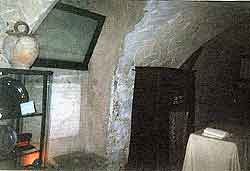Virtual Jewish World: Barcelona, Spain
Barcelona is the second largest city in Spain. It is located on the Mediterranean coast between the mouths of the rivers Llobregat and Besòs.
Jewish History
|
|
According to archeological evidence there existed a sizeable Jewish community in the province of Catalonia, where Barcelona is located, from as early as the beginning of the Common Era. For centuries thereafter, the Jews of Barcelona managed their own local affairs and lived relatively well while confined to the Juderia (Jewish quarter).
In 1263, King James I of Aragon convened a religious disputation in Barcelona with the aim of convincing the Jews to convert to Christianity. Nachmanides, the great Jewish sage and bible scholar, was called upon to represent the Jews of Spain. The disputation lasted four days, during which time Nachmanides argued passionately for the validity of Judaism, and the Jewish community of Barcelona waited nervously for the King’s reaction. At the end of the disputation King James I awarded Nachmanides a large some of money for his eloquence and famously stated that he had never heard someone argue so well for such an unjust cause. Yet, despite the King’s kind words, Nachmanides was later forced to leave Spain and eventually went on to settle in the Land of Israel.
By the fourteenth century the situation of the Jews of Barcelona and all of Spain had worsened significantly. Numerous anti-Semitic decrees were enacted by the monarchy and Catholic Church, and many Jews converted to Christianity while secretly adhering to Judaism to escape persecution. On Ash Wednesday 1391, a series of Church-led riots broke out across the country. The riots reached Barcelona in early August, during which time thousands of Jews were murdered or forcibly converted. While the Jewish expulsion from Spain did not occur until the reign of King Ferdinand and Queen Isabella in 1492, all the Jews of Barcelona either fled or converted years earlier following the riots of 1391.
Barcelona remained devoid of any Jewish presence for more than five hundred years until several Ashkenazi and Sephardic Jews came from North Africa and Eastern Europe at the beginning of the twentieth century. Today, an estimated 3,500 Jews reside in Barcelona, making it the largest concentration of Jews in Spain. In addition to its four functioning synagogues, the Barcelona Jewish community also has a Jewish day school, old age home, Chabad house, and an annual Jewish film festival. In 2016, the first Jewish Literature Festival was held.
Every year, hundreds of schools bring their students to the synagogue, where they are taught about Judaism and the history of the Barcelona Jewish community. International Holocaust Remembrance Day is commemorated annually in the Catalan Parliament.
|
|
Visiting Today
What remains in Barcelona today is but a remnant of the rich Jewish culture that existed during the Golden Age of Spain. One of the main attractions that is still in existence is the ancient Call (Juderia, or ghetto) and the Sinagoga Mayor of Barcelona. Originally built during the fifth century, a new synagogue was later built on top of it in the fourteenth century and additional floors were added to the building in subsequent centuries. Despite perhaps being the oldest synagogue in Europe, the Sinagoga Mayor was forgotten and abandoned until the twentieth century until which point it was used for many purposes including a storage house and dry cleaner.
Lying just outside Barcelona proper are two other ancient Jewish sites. The first is the ancient Jewish cemetery of Montjuic (lit. Jewish mountain) located on the western edge of the city. The ancient cemetery houses the last remains of some of the most notable members of the pre-expulsion Spanish community and is officially a city park.
The second site of interest is the old city of Gerona, which is located approximately 60 miles northeast of Barcelona. While there are few, if any, Jews currently residing in Gerona, this small city was once the home of the great Jewish sage Nachmanides who defended the Jews of Spain in the thirteenth century at the Disputation of Barcelona. The Jewish Museum and Study Center in Gerona is a place to discover Catalan’s Jewish medieval history.
Terror Comes to Barcelona
A van was driven into pedestrians on La Rambla on August 17, 2017, killing 13 and injuring at least 130 people. The driver of the van fled the attack on foot, then killed a 14th victim to steal his car and escape. The terrorist was found and killed by police a few days later. Afterward, Victor Sorenssen, the director of Comunidad Israelita de Barcelona (the Barcelona Jewish Community), declared: The Jewish community here is not afraid. This cowardly act of violence will only make us stronger in our resolve to stay and grow the Jewish community of this amazing city. We Jews of Barcelona have been proudly living in our revived community for 100 years. We aren’t leaving.
Sources: Associació Call de Barcelona;
Heritage Tours Online;
Wikipedia;
Encyclopedia Judaica;
Alan Tigay, The Jewish Traveler, NJ: Jason Aaronson, 1995;
Victor Sorennsen, “The Barcelona Jewish community is not doomed,” JTA, (August 21, 2017).
Photos courtesy of Lisa Fishman and Wikipedia.





